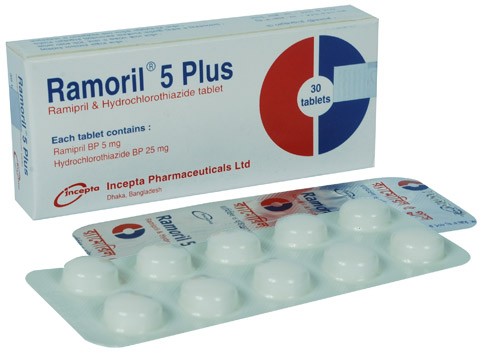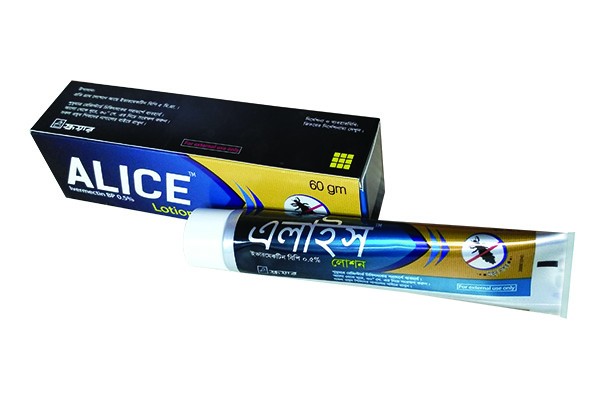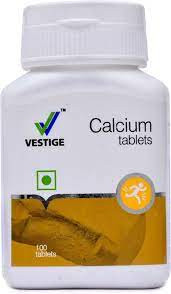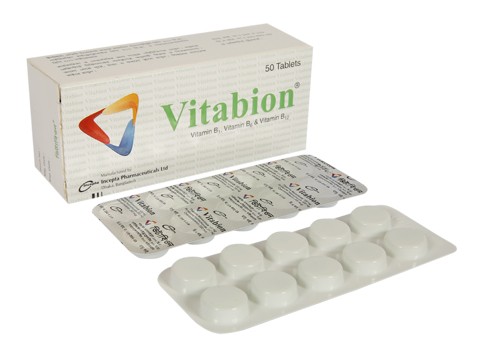

Ramoril Plus Tablet 5 mg+25 mg (10Pcs)
Inhouse product
-
৳1,030.00
৳1,550.00 -
৳10.00
৳12.00 -
৳280.00
৳500.00 -
৳127.00
৳132.00 -
৳900.00
৳1,300.00 -
৳112.00
৳120.00
Reviews & Ratings
Indications
Therapeutic Class
Pharmacology
Hydrochlorothiazide is a thiazide diuretic. Thiazides affect the renal tubular mechanisms of electrolyte reabsorption, directly increasing excretion of sodium and chloride in approximately equivalent amounts. Indirectly, the diuretic action of Hydrochlorothiazide reduces plasma volume, with consequent increases in plasma renin activity, increases in aldosterone secretion, increases in urinary potassium loss, and decreases in serum potassium. The renin-aldosterone link is mediated by angiotensin II, so co-administration of anangiotensin converting enzyme (ACE) inhibitor tends to reverse the potassium loss associated with these diuretics.
Dosage & Administration
Replacement Therapy: For convenience, patients receiving ramipril and hydrochlorothiazide from separate tablets may instead wish to receive tablets of combination of Ramipril 2.5 mg + Hydrochlorothiazide 12.5 mg or Ramipril 5 mg + Hydrochlorothiazide 25 mg. If necessary, the dose may be increased to two tablets of Ramipril 2.5 mg + Hydrochlorothiazide 12.5 mg or Ramipril 5 mg + Hydrochlorothiazide 25 mg once daily.
Maximum daily dose: 10 mg ramipril and 50 mg hydrochlorothiazide (four tablets of Ramipril 2.5 mg + Hydrochlorothiazide 12.5 mg or two tablets of Ramipril 5 mg + Hydrochlorothiazide 25 mg).
Interaction
Contraindications
Side Effects
Pregnancy & Lactation
Precautions & Warnings
Special caution is necessary during the treatment of: Patients with severe and particularly with malignant hypertension. Patients with concomitant and particularly with severe heart failure. Patients in whom fluid or salt deficiency exists or may develop (as a result of inadequate fluid or salt intake) or as a result of diarrhoea, vomiting or excessive sweating in cases where salt and fluid replacement is inadequate. Patients with haemodynamically relevant renal artery stenosis. In patients with pre-existing impairment of renal function or in kidney transplant patients. White blood cell count should be monitored (more frequent in the initial phase of the treatment) so that leucopenia can be detected. Insufficient experience has been gained concerning the use of Ramipril and Hydrochlorothiazide combination in children.
Use in Special Populations
Uue in children: Safety and effectiveness in paediatric patients have not been established
Overdose Effects
Hydrochlorothiazide: The most common signs and symptoms observed are those caused by electrolyte depletion (hypokalemia, hypochloremia, and dehydration resulting from excessive diuresis. If digitalis has also been administered, hypokalemia, may accentuate cardiac arrhythmias. The degree to which Hydrochlorothiazide is removed by hemodialysis has not been established.
Storage Conditions
Frequently Bought Products
-
৳1,030.00
৳1,550.00 -
৳10.00
৳12.00 -
৳280.00
৳500.00 -
৳127.00
৳132.00 -
৳900.00
৳1,300.00 -
৳112.00
৳120.00
Online Shopping Bangladesh : MShopBD-Majumder Shop
MShopBD-Majumder Shop Online Shopping in Bangladesh is the Best Shopping store within 10000+ products cash on delivery in dhaka, Khulna, ctg & all over Bangladesh with COD-cash on delivery (Only Shipping Cost Advance ) under by www.esdp.gov.bd (bangladesh.gov.bd ) Home Delivery all Over Bangladesh different location and shop as like as Multivendor Online Sites in BD.
Thank you for choosing MShopBD - Majumder Shop!







